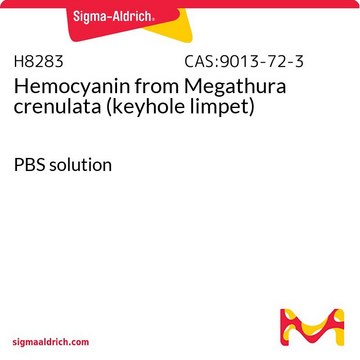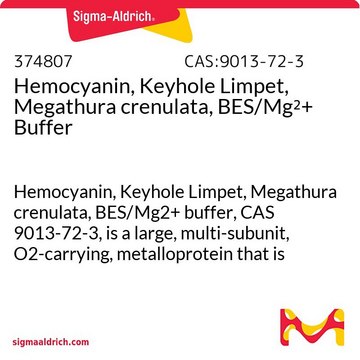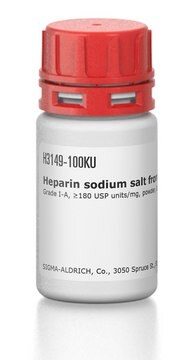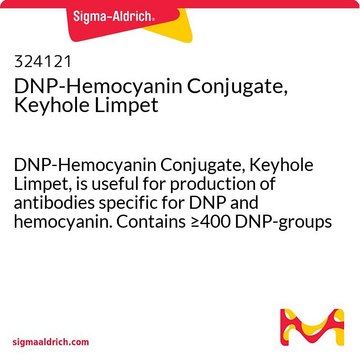374817
Hemocyanin, Keyhole Limpet, Megathura crenulata, Glycerol
Hemocyanin, Keyhole Limpet, Megathura crenulata, Glycerol, is a large, multi-subunit, oxygen-carrying, metalloprotein that is used as a carrier protein in the production of antibodies.
Synonyme(s) :
Hemocyanin, Keyhole Limpet, Megathura crenulata, Glycerol, KLH
Se connecterpour consulter vos tarifs contractuels et ceux de votre entreprise/organisme
About This Item
Produits recommandés
Niveau de qualité
Essai
>90% (size exclusion chromatography)
Forme
liquid
Fabricant/nom de marque
Calbiochem®
Conditions de stockage
OK to freeze
Couleur
clear blue-gray
Conditions d'expédition
ambient
Température de stockage
2-8°C
Description générale
Carrier protein that has many available primary amines to facilitate protein conjugation. Used to immunize animals to elicit antibodies to small molecules (haptens) by covalent conjugation. Protein: ≥10 mg/ml. Sold on the basis of protein content.
Conditionnement
Please refer to vial label for lot-specific concentration.
Avertissement
Toxicity: Standard Handling (A)
Forme physique
In 10 mM MgSO₄, 5 mM BES, 50% glycerol, 0.9% sodium chloride, pH 6.5.
Notes préparatoires
Further dilute with PBS or physiological saline. Material can be dialyzed to remove the glycerol or used as is for conjugation with glutaraldehyde, carbodiimide, or mixed anhydrides.KLH is an extremely large protein complex that has a tendency to aggregate and precipitate from solutions. Use a buffer when diluting KLH and maintain the magnesium concentration at ≥10 mM. Store KLH solutions at 4°C. DO NOT freeze, vortex or agitate to dissolve KLH. Freezing or agitating KLH will cause protein aggregation and precipitation.
Autres remarques
Hayashi, K., et al. 1992. Virchows Archiv. B Cell Pathol.63, 37.
Shuler, K.R., et al. 1992. J. Immunol. Methods156, 137.
Shuler, K.R., et al. 1992. J. Immunol. Methods156, 137.
Informations légales
CALBIOCHEM is a registered trademark of Merck KGaA, Darmstadt, Germany
Code de la classe de stockage
10 - Combustible liquids
Classe de danger pour l'eau (WGK)
WGK 2
Certificats d'analyse (COA)
Recherchez un Certificats d'analyse (COA) en saisissant le numéro de lot du produit. Les numéros de lot figurent sur l'étiquette du produit après les mots "Lot" ou "Batch".
Déjà en possession de ce produit ?
Retrouvez la documentation relative aux produits que vous avez récemment achetés dans la Bibliothèque de documents.
Notre équipe de scientifiques dispose d'une expérience dans tous les secteurs de la recherche, notamment en sciences de la vie, science des matériaux, synthèse chimique, chromatographie, analyse et dans de nombreux autres domaines..
Contacter notre Service technique







